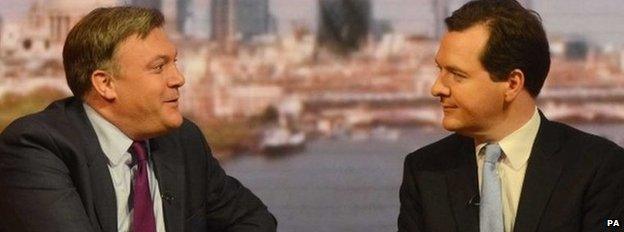Can George Osborne reset the political agenda?
- Published

He who chooses the ground wins the day. That is as true for politicians as it is for soldiers.
And that is what the chancellor's big financial statement this week is all about. It is an attempt by George Osborne to establish the political territory on which the next election is fought.
For more than two months, it has been Labour which has set the agenda. The government's announcement this week that it was taking £50 off people's energy bills was a response to Ed Miliband's promised price freeze. The policy has fixed political debate firmly on Labour's chosen ground - the rising cost of living as inflation outpaces wages.
So on Thursday Mr Osborne will try to retake control of the political agenda. He wants to use his Autumn Statement to change the subject. He wants to refocus minds on the state of the economy and the work that is still to be done.
For the first time in some years he will enjoy positive economic figures from the Office for Budget Responsibility (OBR). He will tell us the economy is growing faster than expected. But do not expect Mr Osborne to dance into the House of Commons with a sunny disposition and a wallet stuffed with cash.
For the last thing the chancellor wants is for us to think that economic recovery is done and dusted. He wants to tell us that the economy is improving but the job is not yet done.
Gags
As one economist puts it, the economy is moving from despair to repair. The implicit message from Mr Osborne will be that, come the general election, voters should stick with the Conservatives to finish the job. He doesn't want people to think the economy is secure enough to risk a vote for the other side.
Thus some in the Treasury are calling this the Goldilocks autumn statement, one where Mr Osborne doesn't want to blow too hot or too cold, where he needs to strike the right balance between optimism and pessimism.
So even though the borrowing figures will be better, any new-found spare cash will probably be directed at paying down the deficit rather than on any spending spree.
Mr Osborne will make a virtue of that, arguing that he will stick to his economic plan through good figures as well as bad. He will say that growth in itself will not get rid of a structural deficit; that will be achieved only by pressing on with his absolute cuts to public spending.
I expect him to note that we still have the fourth largest deficit in UK history. He may even crack the odd gag about being the new Iron Chancellor.
His political message will be clear: in his view, the government has a long-term, serious plan for the economy to which it is sticking. In contrast, he will claim Labour has vacated the field, that unworkable gimmicks like a price freeze do not amount to a credible economic policy.
And he will claim that the biggest risk to recovery is not another crisis in the eurozone but any decision to give up on deficit reduction.
But when shadow chancellor Ed Balls stands up in the House of Commons, he will do all he can to keep the focus firmly on the cost of living.
Yes, he will accept - and even welcome - the return to growth, but he will say it is despite and not because of government policy.
He will probably note how the growth is being generated more by consumer spending and rising house prices than by business investment and export growth. He will say the positive economic news should not be contrasted with the OBR's forecasts in March, which were particularly gloomy.
Instead, he will remind MPs of the government's original, rather Panglossian plans in 2010, promises that are still a long way off being fulfilled. Above all, Mr Balls will say that the link between the recovering economy and people's living standards has been broken and the government has to act to fix that.
So the Autumn Statement will have its usual stories about tax breaks for business, a crackdown on tax avoidance, and a continuing freeze on fuel duty.
The chancellor will also have to tell us how he is going to pay for a rather expensive party conference season where the Tories and the Lib Dems promised tax breaks for some married couples and free school meals for more pupils.
But the overarching political test will be whether Mr Osborne can begin to change the political conversation away from cost of living and back to the economy. Many votes will depend on how he does.
* Mr Osborne will update MPs on the state of the economy from 11:15 GMT on Thursday, with live coverage and analysis of the Autumn Statement on the BBC news website, BBC TV and radio.